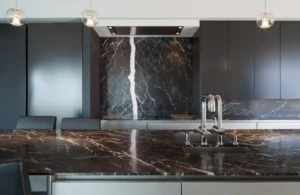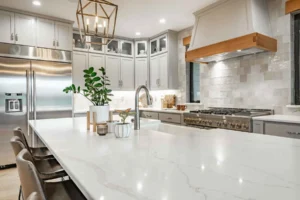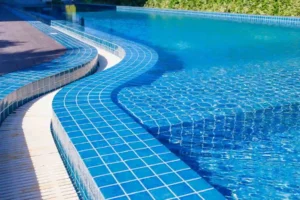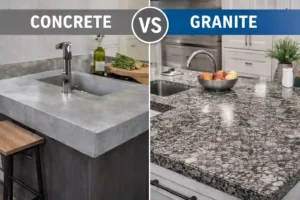When it comes to selecting the perfect material for your kitchen or bathroom countertop, porosity plays a crucial role in determining its durability and maintenance needs. So, is marble porous? Yes, it is. But how does it compare to other popular countertop materials like quartz, granite, and limestone? In this article, we will explore the porosity of marble and other countertop materials, focusing on how this property affects their appearance, longevity, and care requirements.
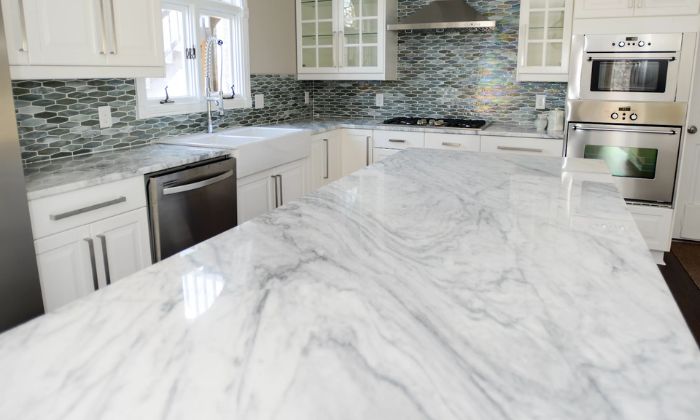
Table of Contents
ToggleWhat Does Porosity Mean in Stone?
Porosity refers to the presence of tiny pores or holes within a material that can absorb liquids. These pores are microscopic and occur naturally in many stone materials. In the context of countertops, porosity impacts the material’s ability to resist stains, its susceptibility to damage, and how easy it is to clean. A more porous material tends to absorb more liquid, making it more vulnerable to staining from everyday kitchen spills, like coffee, wine, or lemon juice.
When considering stone materials for countertops, understanding the porosity of each material helps determine its suitability for specific kitchen or bathroom needs. For example, porous stone materials require more maintenance than non-porous surfaces, especially in high-traffic areas.
Porosity of Countertop Materials: Marble vs Quartz vs Granite vs Limestone
Let’s take a closer look at the porosity of popular countertop surfaces: marble, quartz, granite, and limestone. Each of these materials varies in terms of porosity, which influences their overall performance.
Quartz: The Surface No Acidic Opponent Can Beat
Quartz countertops are engineered from a mix of crushed quartz, resins, and polymers, making them incredibly durable and non-porous. Unlike natural stones, quartz is impervious to liquids, which means it doesn’t absorb water, oils, or acids. This quality makes quartz countertops highly resistant to stains, even from acidic substances like lemon juice or wine.
If you’re looking for a stone countertop that’s easy to clean and virtually stain-free, quartz is an excellent choice. Its non-porous surface ensures that liquids stay on the surface, making it easier to wipe up spills and avoid permanent damage.
Granite: Beautiful, Stronger Than Oak, But Porous
While granite is known for its strength and stunning aesthetic appeal, it is still a porous stone. Like marble, granite contains small pores that can absorb liquids if not sealed properly. Although granite is much harder and more resistant to scratches than marble, its porous nature means that it can still be susceptible to stains from oils, food, and beverages, especially in areas like the kitchen.
Granite countertops are typically sealed to reduce their porosity, but over time, the sealant can wear off, requiring reapplication. However, even with proper sealing, granite is more porous than quartz and still requires careful maintenance to ensure it remains in good condition.
Marble’s Porous Dilemma
When discussing whether marble is porous, it’s essential to recognize that this stone is one of the most porous natural stones available. Carrara marble and other types of white marble are particularly susceptible to absorbing liquids, making them prone to staining from common kitchen substances such as wine, olive oil, and even acidic items like lemon juice or tomatoes.
The porous surface of marble means that liquids can penetrate deep into the stone, potentially causing permanent stains if not wiped up quickly. This is why marble countertops especially those made from Carrara marble require more maintenance and care than granite or quartz surfaces.
Handle Limestone’s Porosity With Care
Limestone is another porous stone material, although it is typically softer and more fragile than granite or marble. Like marble, limestone countertops are susceptible to staining, especially in areas where acidic foods or drinks are frequently used. The porous nature of limestone can cause the stone to absorb oils, water, and acids, making it prone to discoloration.
If you opt for limestone in your kitchen, it’s essential to seal the surface regularly to prevent damage. Because of its softness, limestone can also be scratched more easily than granite or quartz.
The Effect of Porosity on Marble’s Durability
Is marble porous in a way that affects its durability? Absolutely. The porous nature of marble can significantly impact its longevity if not properly cared for. Since the stone absorbs liquids, it’s more prone to damage from stains, scratches, and even etching. Etching occurs when acidic substances like lemon juice, vinegar, or cleaning products come into contact with the surface, leaving behind marks or dull patches.
Despite these challenges, marble countertops are still highly valued for their classic beauty and elegant appearance. However, if you choose marble for your countertop, you must understand that its durability depends on proper maintenance and care to minimize the effects of porosity.
How to Care for Marble to Minimize the Effects of Porosity
To get the most out of your marble countertop, here are a few essential care tips to minimize the effects of its porosity:
Seal the Surface Regularly
One of the best ways to protect marble from absorbing liquids is to apply a stone sealer. This creates a protective barrier on the surface that helps prevent liquids from soaking into the pores. You can reapply the sealer periodically to maintain this protection.
Clean Spills Immediately
Since marble countertops are susceptible to stains, it’s important to clean up any spills as soon as they occur. This is especially true for acidic substances like lemon juice, vinegar, or wine, which can cause permanent etching on the surface.
Use Cutting Boards and Trivets
To avoid scratching or damaging your marble in the kitchen, always use cutting boards and trivets for hot pots and pans. This helps prevent direct contact with the countertop surface, reducing the risk of stains or physical damage.
Avoid Harsh Chemicals
Harsh cleaning chemicals can damage the sealant and affect the stone’s appearance. Instead, use a mild soap solution and a soft cloth to clean the surface. Avoid acidic or abrasive cleaners that can wear down the protective layer and expose the stone to more significant damage.
Is Porous Marble Right for You?
While marble countertops offer unparalleled beauty, they do come with some challenges due to their porosity. If you’re considering marble for your kitchen or bathroom, it’s essential to weigh the pros and cons of its porous surface. If you don’t mind the extra maintenance and are willing to take care of the stone by regularly sealing it and cleaning up spills promptly, then marble can be an excellent choice.
However, if you prefer a countertop that requires less upkeep and is more resistant to staining, you might want to consider granite or quartz. Carrara marble, while stunning, is one of the most susceptible to stains due to its high porosity, so it’s not always the best option for high-traffic kitchen areas.
Our Marble Promise
At SF Marble & Granite, we believe in marrying timeless beauty with modern practicality. Our passion is not just in offering exquisite marble but in providing you with expert guidance on how to care for it. We’re committed to quality, transparency, and a personalized touch that ensures your countertops remain as elegant as the day they were installed. Trust us to deliver luxury and lasting durability with every project.
Conclusion
Is marble porous? Yes, it certainly is, and this characteristic plays a significant role in determining how you should care for it. While marble is known for its elegant appearance, it requires regular maintenance and attention to minimize the effects of porosity. If you prefer a countertop material that is less porous and more resistant to staining, quartz and granite are excellent alternatives. However, if you’re drawn to the timeless beauty of marble and are willing to invest in its upkeep, this natural stone can make a beautiful addition to your home. Just remember, proper care is key to maintaining the integrity and longevity of your marble surface.
FAQs
Is marble really porous?
Yes, marble is naturally porous. This means it can absorb liquids, which is why proper sealing and regular maintenance are essential.
How does marble porosity affect its durability?
Because marble absorbs liquids, it’s more prone to stains, etching, and scratches if not well maintained. Regular sealing and careful cleaning help preserve its beauty.
Can I compare marble’s porosity to other countertop materials?
Absolutely. Quartz is non-porous and highly resistant to stains, granite is less porous than marble but still requires sealing, while limestone is softer and more delicate.
What can I do to minimize the effects of marble’s porosity?
Use a high-quality stone sealer regularly, clean spills immediately, and avoid harsh chemicals to keep your marble looking its best.
Is marble the right choice for my kitchen countertop?
If you love marble’s classic beauty and are willing to invest in its care, it can be a stunning choice. However, for lower-maintenance needs, quartz or granite might be a better option.

